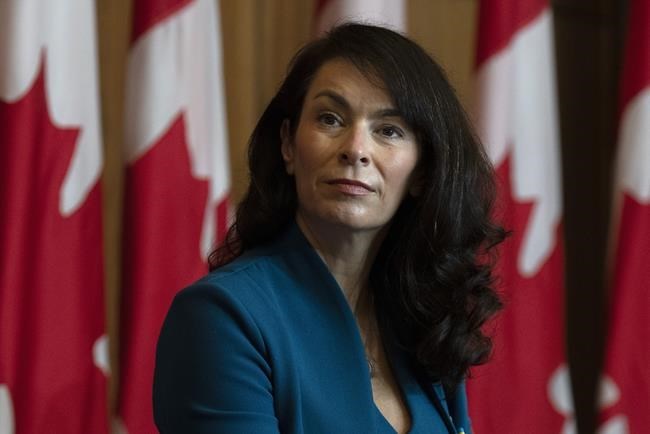OTTAWA — The NDP is accusing the Liberals of basing their sanctions regime on "political theatre" as data suggest few funds have been frozen and none have been seized.
"This government constantly pats themselves on the back for adding individuals to the sanctions list," NDP MP Heather McPherson said Tuesday in the House of Commons.
“The Liberals claim sanctions are a key piece of our foreign response, but there is no enforcement, there’s no investigation and there is almost no seizing of assets.”
The federal government has been announcing sanctions almost weekly that bar people associated with authoritarian regimes from having financial dealings in Canada and from entering the country.
Yet publicly released RCMP data show barely any change in the amount of money frozen in Canadian bank accounts between June and December of last year, despite hundreds of people being added to sanctions lists.
As of June 7, Canada had ordered frozen $123 million in assets within Canada, and $289 million in transactions had been blocked, both under sanctions prohibitions related to Russia.
By late December, the RCMP said $122 million in assets were listed as seized, and $292 million in transactions had been blocked — despite hundreds more people associated with Russia being put on the sanctions list.
The police force did not have an explanation for why the sums reported by financial institutions had hardly changed during that period.
In late December, the RCMP notedthat no banks had informed them of any sanctioned Haitians or Iranians holding assets in Canada.
Meanwhile, parliamentary disclosures requested by McPherson show that Ottawa has still not used a law it passed last June that allows the government to take possession of funds from sanctioned people and divert them to victims of wrongdoing.
The government issued an order for the restraint of property in December to start the process of forfeiting US$26 million held by a firm owned by Russian oligarch Roman Abramovich, but it has yet to file an application in court.
McPherson argues that Canada is using sanctions as a symbolic tool, without taking the steps to actually disincentivize support for autocracies.
Foreign Affairs Minister Mélanie Joly responded to the criticism by offering to work with the NDP on using sanctions to forfeit assets and divert them.
"We're the first country in the world doing this, and we will lead," she told the Commons.
"We've imposed extremely strong sanctions against Russian oligarchs, Belarusian oligarchs, Haiti elite members as well as Iranians."
Sanctions experts have long argued that Canada lacks the means to properly monitor its regime, such as by tracking financial transactions and following how assets are traded.
For years, the U.S. State Department has deemed Canada to be a "major money laundering country" due to its weak enforcement of laws.
In March 2022, the department included Canada in a published list of 80 countries it considers to have inadequate tracking of financial dealings.
Canada's new law on forfeiting assets is the first among G7 countries that attempts to seize financial holdings using sanctions law.
Analysts and lawyers have said it marks a major change in how countries use sanctions, which are normally created as temporary measures to try changing behaviour, with the idea of later unfreezing accounts.
The new law instead seeks to punish the people accused of human-rights abuses. The funds can only be used to compensate victims, rebuild affected states or support peace initiatives.
This report by The Canadian Press was first published Jan. 31, 2023.
Dylan Robertson, The Canadian Press



